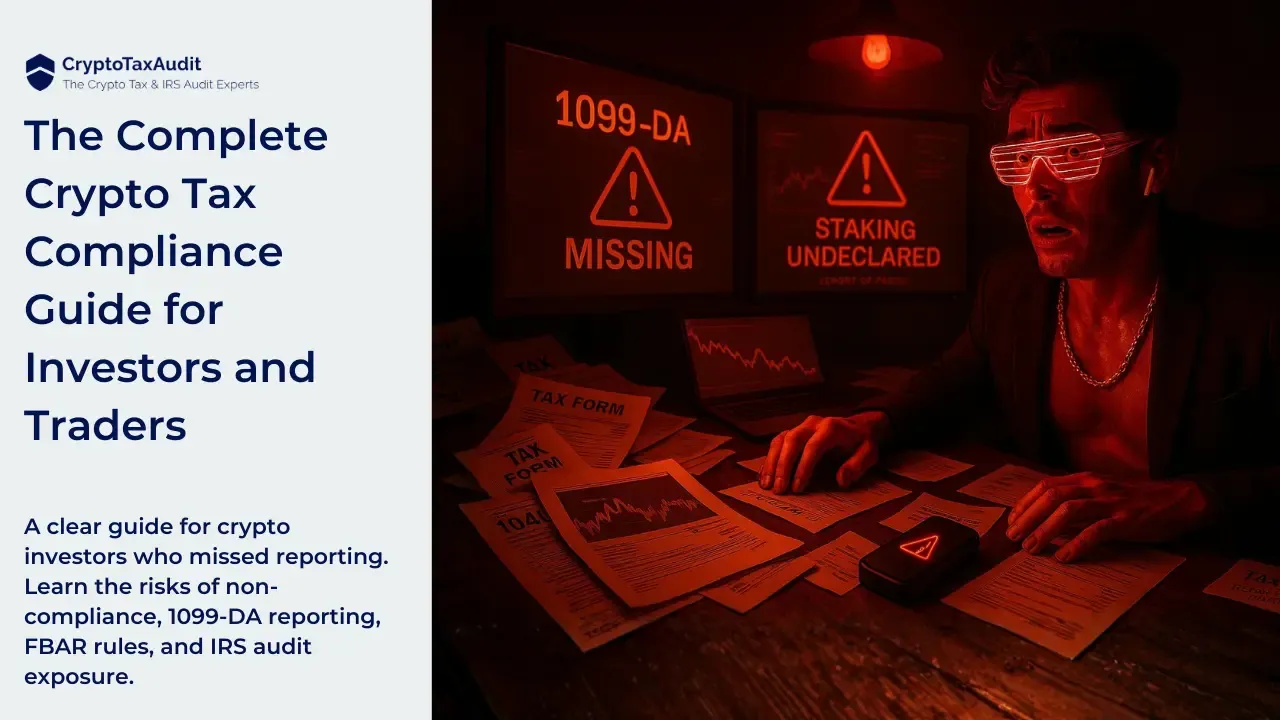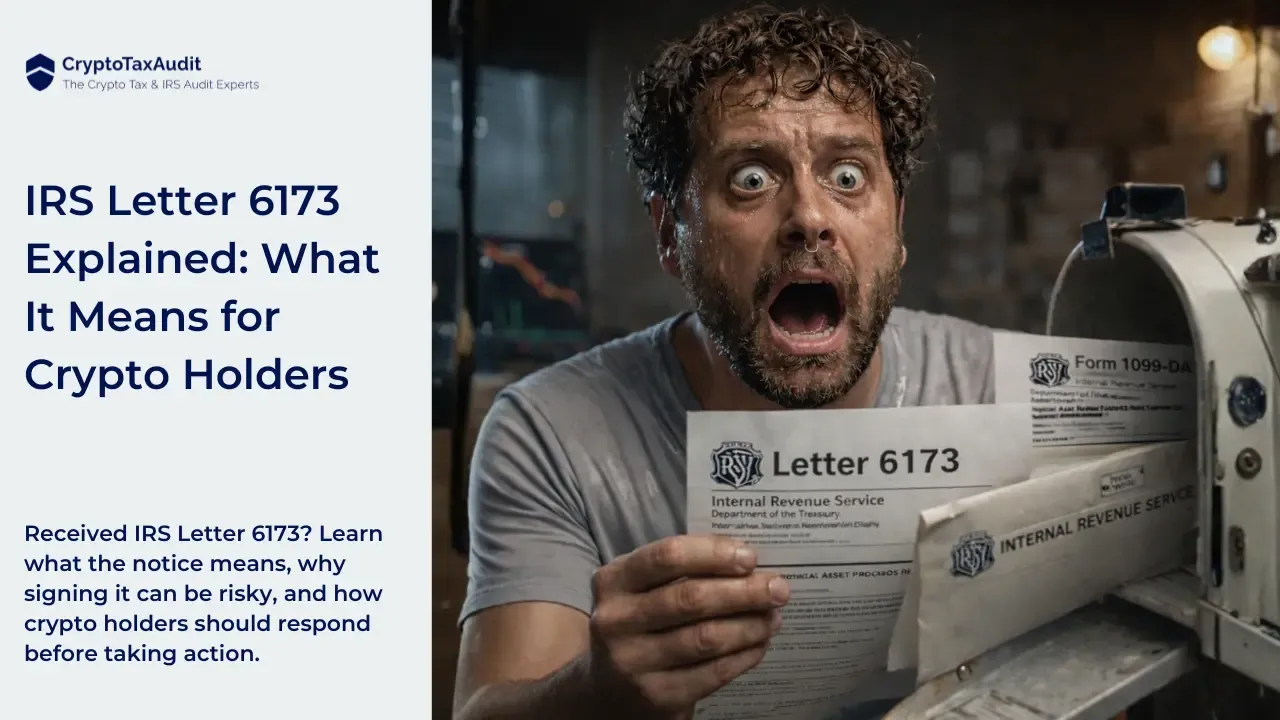Understand what makes you a target of an IRS Audit, including immediate protective measures all crypto traders should take today.
How can you avoid an IRS audit?
Before digging into the nitty-gritty of what happens during an IRS audit, it's critical to understand protective measures you can begin today that immediately reduce your chances of getting an IRS audit.
- Make sure the return preparer enters all the W-2s, 1099s, etc. Pull your IRS wage and income transcript to make sure you got all there were sent. (This is automatically pulled for transcript members of CryptoTaxAudit.)
- Do not exaggerate about claiming earned income or child tax credits.
- Report self-employment taxes if you are a contractor.
- Include a Form 8275 disclosure statement about any uncertain tax positions. (A form is provided on the CryptoTaxAudit free masterclass on preparing your crypto tax return.)
- Become an IRS Guard Dog member, only from CryptoTaxAudit. Members get notified of pending audits so that the return can be corrected and refiled before the audit.
What does the IRS know about your income?
The U.S. income tax system depends heavily on voluntary compliance by taxpayers. To encourage compliance, the IRS uses audits. The objective of an examination is to determine if income, expenses, and credits were accurately reported.
The tax law requires businesses to file information reports (Forms W-2, 1099, K-1, etc.) annually on the amounts paid to others and any taxes withheld. Studies have shown that the compliance rate increases from 45% to 99% on income reported to the IRS. (TIGTA, "The IRS can improve taxpayer compliance for virtual currency transactions," #2020-30-066, 9/24/2020)
Form 1099 is the form used to report most of these payouts. Companies send these forms to the taxpayer and the IRS.
Here are some familiar versions of these forms:
- 1099-DIV Dividends paid
- 1099-B Brokerage statement of capital gains from trading
- 1099-INT Interest paid
- 1099-G Tax refunds from federal, state, or local government
- 1099-K Third-party network transactions
- 1099-MISC Miscellaneous payouts
- 1099-NEC Contractor payouts
- Form W-2 Wages paid and taxes withheld
- 1098 Loan payments by a taxpayer to banks
- 1095 Health insurance payments
Foreign exchanges do not issue a 1099-K. Only some U.S. exchanges give a 1099-K. Coinbase stopped issuing a 1099-K in 2020 because the IRS failed to issue guidance for reporting requirements for crypto exchanges.
Some U.S. crypto exchanges issued 1099-MISC forms to report reward and staking income. Closed exchanges like Robinhood issues a 1099-B to report capital gains. These forms are beneficial for tax preparation. They can only do this because they are closed, not allowing cryptos to transfer in or out of the exchange.
What triggers an IRS audit?
The IRS uses enormous supercomputers that use data mining techniques to select tax returns they want to audit. Selected returns have an audit indicator flag placed on the return. The team members at CryptoTaxAudit get notified quickly when this flag is placed on a tax return.
There are two types of audit flags. The first is for under-reporting of income; the second is for the assignment of an auditor.
What is a CP2000 audit?
The IRS Automated Under Reporter system compares the income reported on a tax return to the income reported on the W-2, 1099, 1098, and 1095 forms. Failure of a return to account for this known income is the most common form of an audit. When a return is flagged, the IRS sends the taxpayer a letter known as the CP2000 letter after the letter's code name.
A CP2000 audit is computer-driven and resolved via mail or fax. The letter lists the form not accounted for on the tax return. They then calculate the additional tax plus penalties and interest owed because of not reporting this income. These calculations are usually wrong. They expect you to pay what they ask. After two months, they will start sending collection letters that get increasingly threatening.
These types of audits are usually resolved by sending one letter with the missing information and an explanation.
Many crypto traders got CP2000 audits because they failed to report on their return a 1099-K from a crypto exchange. If you received a 1099-K, you must tell your accountant or enter it into the tax software you are using; otherwise, you will get the CP2000 letter.
How are traditional IRS audits selected?
Once a return is flagged for a traditional audit, an auditor doesn't get assigned for two to six months later. The auditor reviews the return and decides if it is worth their effort, then they issue the audit letter to the taxpayer.
Each year, the IRS identifies compliance campaigns to focus on specific areas where they feel a significant opportunity to abuse the tax system. For several years cryptocurrency reporting has been a compliance campaign.
In 2021, the IRS started a new compliance campaign on Puerto Rico Act 22 compliance. This is a very focused campaign on high-net-worth individuals using Puerto Rico's 0% tax incentives to avoid U.S. taxation. This campaign focuses on meeting residence and income reporting requirements.
The compliance campaigns use data mining studies to target clients most likely to be abusing the tax laws.
Audits are focused. They usually only audit one tax return at a time. The other years are not considered unless there is evidence of significant errors. Many people have an excessive fear that the IRS will audit everything about their lives.
An audit usually takes a year and a half to complete. Auditors juggle 50 audits at a time, so the whole process goes a lot slower than one wants.
Taxpayers expecting to pay a hefty amount because of the audit can make a conditional payment to the IRS pending the audit results. The purpose of this is to halt the continued accumulation of interest while the audit/appeal/court case proceeds.
What are the phases of an IRS audit?
There are generally 3 phases:
- Audit response (information gathering and analysis)
- Appeals
- Tax Court
A prudent taxpayer will hire someone to represent him before the IRS. A representative must be either a CPA, an Enrolled Agent, or a tax lawyer. The representative must be registered on the IRS authorized preparer system (irs.treasury.gov/rpo). Do not use anyone who isn’t listed.
A CPA or Enrolled Agent is the best option for the audit. Using a lawyer for an audit is an expensive option unless there is concern the audit might turn into a criminal investigation. Once you decide to go to Tax Court, only a tax lawyer or someone with a U.S. Tax Court Practitioner license can represent you.
Congress passes a Taxpayer Statute of Rights and significant procedural protections for the taxpayer. A good representative is well-studied and experienced in knowing these protections and protecting their client. Violations of these procedures by the IRS can be grounds for successfully appealing an auditor's decisions and actions. Applying the procedures can save the taxpayer from an aggressive auditor.
Never talk directly to the auditor. They're trained to get damaging information from you as quickly as possible.
It is just like on TV shows. You never talk to the policeman without a lawyer present. You have the right to representation. If the auditor calls you, tell him to speak to your representative.
How is information gathered during an IRS audit?
There are six general methods that an auditor can use to accumulate evidence.
- Documentation – examine taxpayer's crypto and financial records to determine accuracy claimed on tax return
- Analytical Tests – Comparisons and relationships that determine the accuracy of a return
- Interviews – interview taxpayer and third parties
- Inspection – physically examining taxpayer's assets. This can include issuing summons to financial institutions and others to turn over all records they have about the taxpayer
- Observation – surveillance of taxpayer's home and business
- Testing – verifying the accuracy of taxpayer's books and records
What information is collected during an audit?
The auditor sends a document entitled "Form 4564 Information Document Request" (IDR). They will ask for copies of all bank, brokerage, and credit card statements for the year under audit.
Also, for crypto audits, they always request detailed records for the acquisition and disposition of any virtual currency (domestic or international), including for not limited to:
- Emails, screenprints, hardcopy prints, and transaction receipts maintained by the taxpayer or provided by any third party such as an exchange, broker, or peer-to-peer facilitator (e.g., Paxful, Localbitcoins.com)
- Wire transfer or direct deposit records, including automated clearing house (ACH) and electronic funds transfer (EFT) records
- List of all virtual currency kiosk (i.e., BTM or cryptocurrency kiosk or ATM) locations used along with copies of any transfer receipts or acknowledgements whether provided electronically or on paper
- A detailed list of cryptocurrency transactions involving cash, including dates, input/output counterparties involved in the transaction, and the cryptocurrency involved
- All correspondence (i.e., emails, texts, tweets, etc.) with all counterparties to any virtual currency transactions
- List of all virtual currency received from hardforks, faucets, tipping, or any other method where a sale, buy, or exchange was not initiated by the receiver of cryptocurrency (commonly called airdrops), including the date, type, and amount of virtual currency received with the date of sale, or other disposition, including amounts and description of what was received
- Explanation of the method used to compute basis relating to the sale or other disposition of virtual currency
- Records reflecting the valuation of any sale or other disposition of virtual currency at the time of acquisition and disposition
- Records relating to any expenses paid or items purchased (whether domestic or international) using virtual currency, such as video game purchases and sales
- List of all blockchain addresses owned or controlled by the taxpayer
- Records of all transactions relating to lending of virtual currency or use of virtual currency as collateral for a loan, including but not limited to loan agreements, promissory notes, ledgers, transaction receipts, pledge, security, or collateralization agreements
- List of all digital currency exchange (DCE) and peer-to-peer (P2P) facilitators (e.g., Coinbase, Paxful or Localbitcoins.com) (foreign or domestic) with associate user I.D.s, email addresses, I.P. addresses, and account numbers relating to those platforms
- List of all counterparties for any P2P virtual currency transaction (identifying the on-chain and off-chain transactions), email addresses, user I.D.s transactions
- All records reconciling acquisition, whether by purchase or cryptocurrency-to-cryptocurrency (C2C) transaction, and sales, or other disposition such as C2C transaction histories or receipts and counterparties to all transactions
- All records relating to investment expenses claimed with respect to any investments in virtual currency, including but not limited to invoices, receipts, canceled checks, bank records
- All records relating to any lending or borrowing (on margin or otherwise) through fiat currency or in cryptocurrency
In short, they want every document you have about your crypto activities during the year. When our office compiles these documents, they are 300-1200 pages long depending on how many transactions need to be listed.
If you fail to provide these documents, the auditor can subpoena U.S. banks, credit card companies, and crypto exchanges for every record they have. If you are uncooperative, it will prevent you from getting heard during any appeal.
If you are under audit, do not fabricate or backdate any documents you give to the IRS. If discovered, it could convert your case into a criminal fraud case.
The lifestyle interview.
After the auditor receives these documents, the auditor will request an interview with the taxpayer. Your representative should handle this interview without the taxpayer present. Your representative should thoroughly know your financial and personal life before the interview.
Discovering hidden income by doing a bank deposit analysis.
Auditors always do a bank deposit analysis. They list all the deposits in all your bank and brokerage accounts. They eliminate the re-deposits, which are when funds are transferred from one of your accounts to another. The remaining deposits are considered income unless you can prove otherwise. To this amount, they add any credit card or loan payments not made from one of your accounts.
The total income from the bank deposit analysis is compared to your income reported on the return.
Discovering hidden income by doing an expense analysis.
Sometimes an auditor will total up your lifestyle expenses by adding up your credit card charges, ATM withdrawals, loan payments, health insurance payments, lease payments, school costs, etc. If the costs exceed your income, then they will assume you are hiding some income.
Preparing the IRS audit report.
After the auditor has completed the analysis, they prepare a preliminary audit report listing their calculation of your income and the additional taxes due plus any penalties and interest.
The taxpayer gets a chance to explain to the auditor anything misunderstood. Then the auditor will revise the report as appropriate and make it final. Once it is final, you will receive a Statutory Notice of Deficiency letter, which gives you ninety days to appeal the results or accept the report.
Sticker shock: How penalties and interest are calculated.
After the amount of additional taxes owed (understatement), then the auditor calculates penalties and interest.
If the understatement of taxes is greater than 10% of the total tax and $5,000, the auditor can impose a 20% accuracy penalty on the understatement. The 20% is increased to 40% on the portion of understatement related to a gross valuation misstatement, undisclosed foreign financial assets, among other reasons.
Crypto traders may be subject to the 40% penalty for trading on non-U.S. exchanges or with non-U.S. persons. The IRS yet has not claimed this yet in court.
If the auditor believes that the taxpayer engaged in deception or fraud on the return, then the accuracy penalty is replaced with a 75% civil fraud penalty. Because the understatement wasn't paid when originally due, there is a 0.5% per month failure-to-pay penalty on the first 36 months.
In addition, the understatement is subject to interest payment on the understatement from when the taxes were originally due. The interest rate fluctuates quarterly but is currently around 4% per year
Payment of understatement.
Once the 90-day Notice of Deficiency passes, the IRS will want to receive payment. Interest will continue to grow as long as there is a debt.
If you can't pay the taxes in full, you should consider borrowing money to pay off taxes. Otherwise, if the debt is below $100,000, you can apply for an IRS installment plan to pay the amount off over time.
The likelihood of being audited again may go up.
If required to pay an accuracy or fraud penalty, the taxpayer will be marked as a low-compliance person and will be more likely to be audited again.
How to appeal to the IRS auditor.
During the entire process, the taxpayer is not at the mercy of the auditor. A meeting with the auditor's manager (called a group manager) can be scheduled at any time. Further, you can contact the group manager's manager if necessary to protect the taxpayer's rights.
Sometimes during an audit, there is a dispute that isn't quickly resolved. The taxpayer can request Fast Track Settlement to get an appeals officer involved to resolve the selected issue.
Finally, after the auditor gives his final report, the taxpayer can request a review by the IRS Independent Office of Appeals. An appeals officer has the authority to overturn part or all of the audit assessment. No new evidence can be introduced during the appeals process. The purpose of the appeal is to assure that the taxpayer received a fair and impartial audit by reviewing the documents provided and the auditor's notes. The appeals process can take 4-12 months to conclude.
The tax court option.
If a taxpayer still feels he is unfairly taxed, his next option is to file a tax court case. During tax court, the entire case and evidence are presented afresh before a judge.
Audit process summary.
While CP2000 audits can get quickly resolved by mail, a formal audit and any subsequent appeal are drawn-out processes and may take multiple years to resolve.
In this case, you'll want the best defense team available at your side.
CryptoTaxAudit offers a unique and affordable membership called IRS Guard Dog, design to monitor, advise, represent, and defend you in the even of an IRS audit. Learn more today.
DISCLAIMER: Opinions and perspectives of the author, host, and guests. It should not be construed as U.S. taxpayer advice. There are often multiple interpretations of tax law. Various strategies may be suited to specific individuals and for particular situations. Seek out professional tax, legal, or financial advice from CryptoTaxAudit or from other reputable companies.





